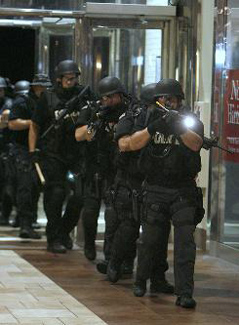
Members of law enforcement agencies conduct training exercises in Pecanland Mall in Monroe, La., on Aug. 26 (Terrance Armstard, The (Monroe, La.) News-Star, via AP)
Even as hundreds of police officers across the country are losing their jobs, law enforcement officials say there is another disturbing casualty of the financial downturn: basic training.
Nearly 70% of police agencies cut back or eliminated training programs this year as part of local government budget reductions, according to a survey this fall of 608 agencies by the Police Executive Research Forum, a Washington-based think tank.
The cuts include a wide range of programs, from ethics and basic legal training to instruction on the proper use of force.
Harvey Hedden, executive director of the International Law Enforcement Educators and Trainers Association, says the cuts are "alarming."
"In a lot of cases, training determines whether someone survives or not in our business," Hedden says.
Tulsa Police Chief Chuck Jordan says his department's entire in-service training program was shuttered for a year, beginning in June 2009.
The shutdown interrupted crucial crime-scene investigation training and weapons instruction.
Yet, faced with the prospect of layoffs, Jordan says the training cut was a "no-brainer."
"We needed to keep people on the street and saw the cuts to training as a bridge to better times," Jordan says.
Daytona Beach (Fla.) Police Chief Michael Chitwood says his department's entire $200,000 training budget was wiped out this year because of municipal service reductions.
The chief says he is working with local universities that have volunteered to help restore the programs, including instruction on the proper use of stun guns and how to defuse potentially dangerous confrontations with the mentally ill.
The chief says city leaders were aware of the risk of lawsuits related to potential officer mistakes and misconduct but that the city decided to "pay on the back-end."
"The private sector was appalled when they found out about this," Chitwood says.
In Philadelphia, Police Commissioner Charles Ramsey says he refuses to curtail training because there is too much at stake.
"When you cut back on training, officers are sued and fired. I learned a hard lesson from that," Ramsey says, referring to incidents during his previous stint as chief in Washington, D.C. "We're doing everything we can to avoid that."
In some cases, the fallout may not be felt right away, but analysts say the scope of the cuts could soon create serious problems.
"When you pull away the support beams of a building, it doesn't fall down immediately," says Chuck Wexler, executive director of the Police Executive Research Forum. "But eventually, it's going to have an impact."











